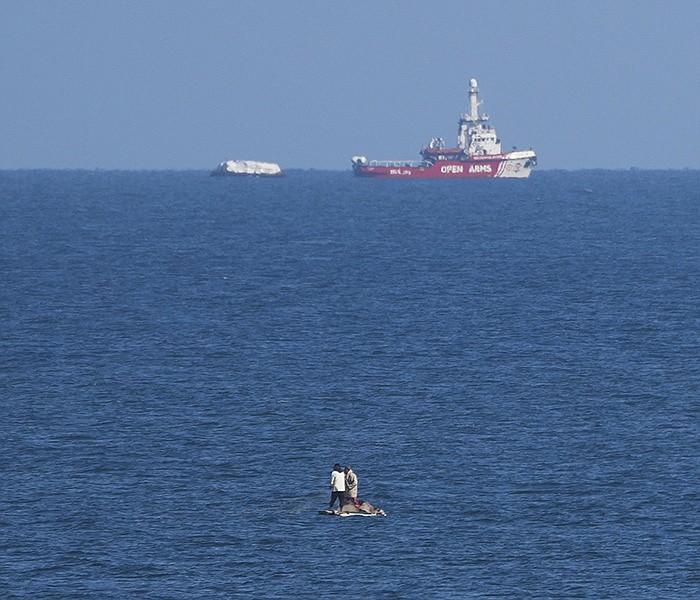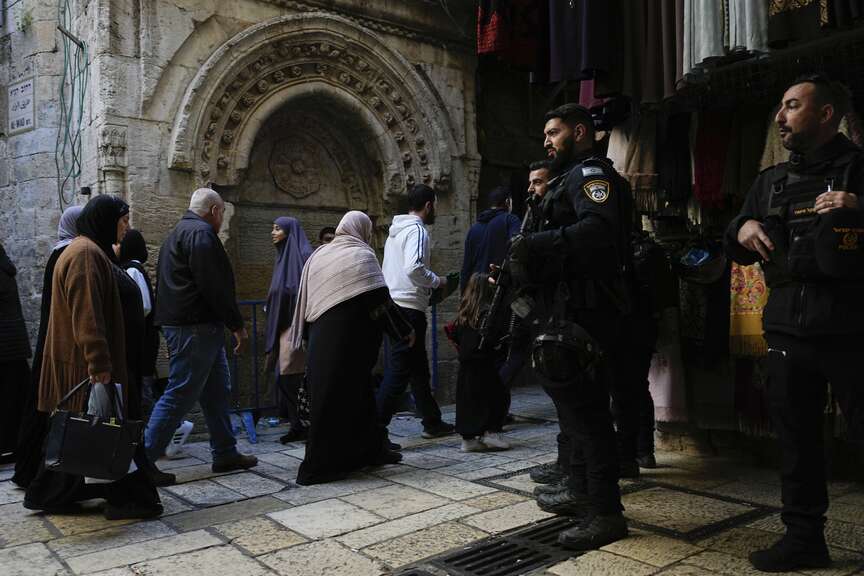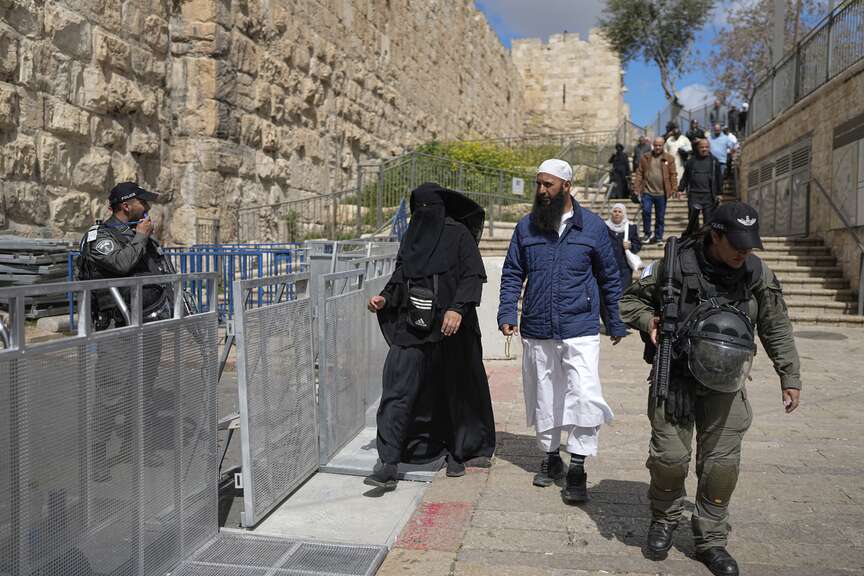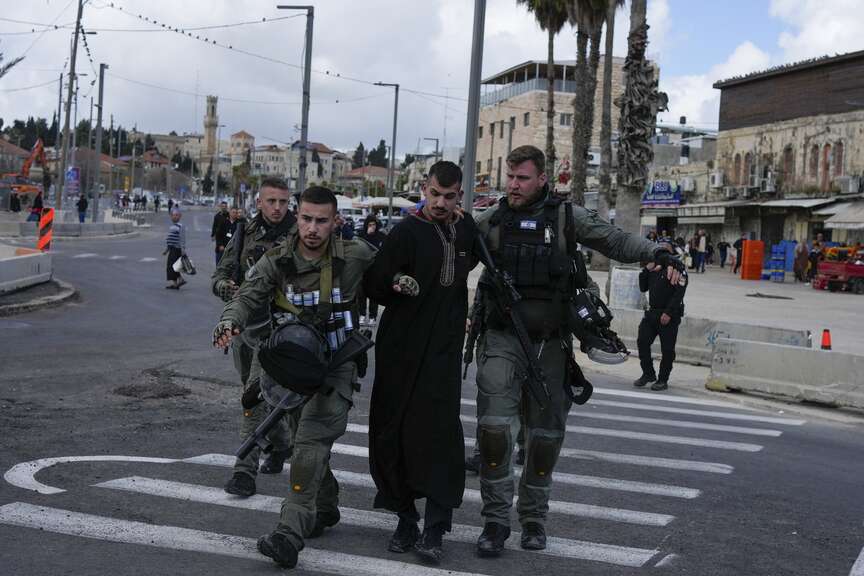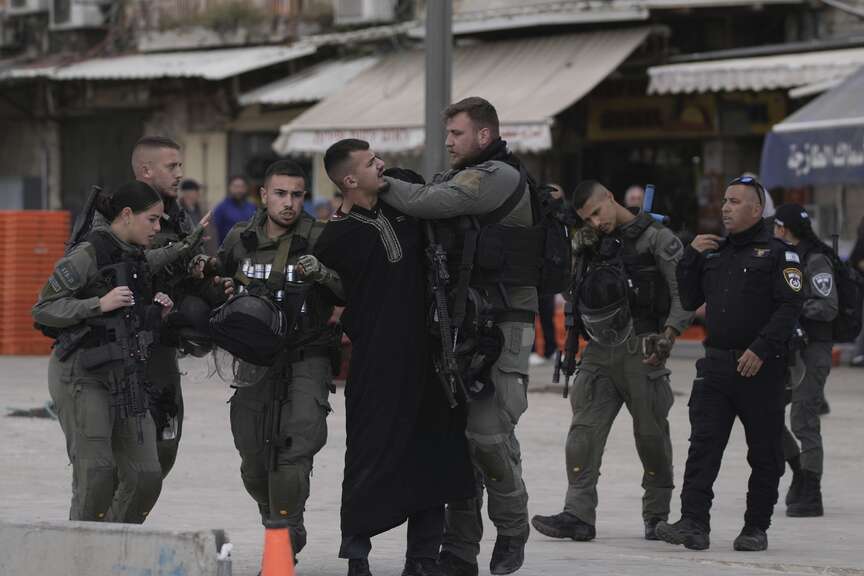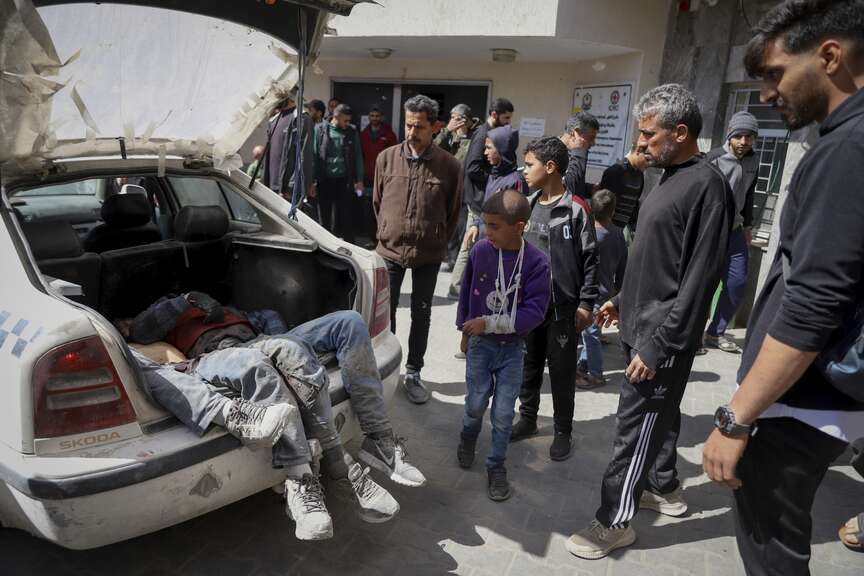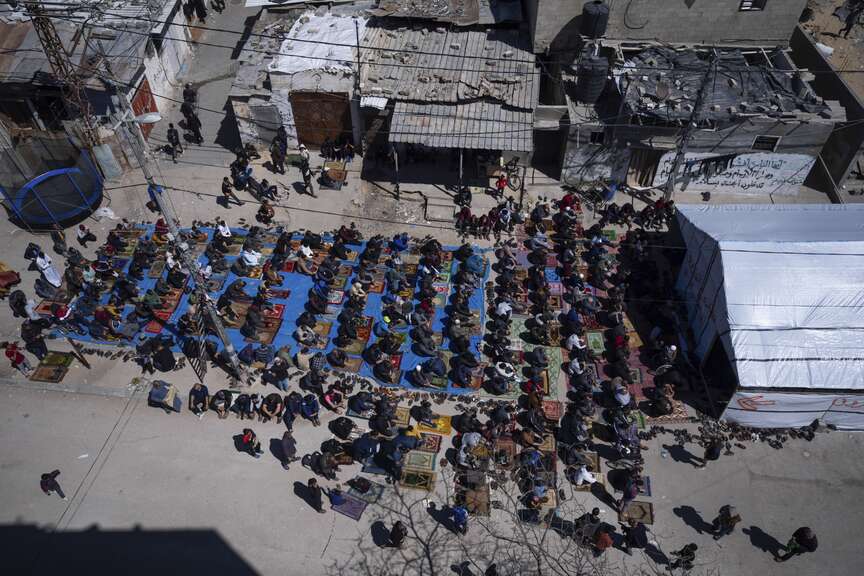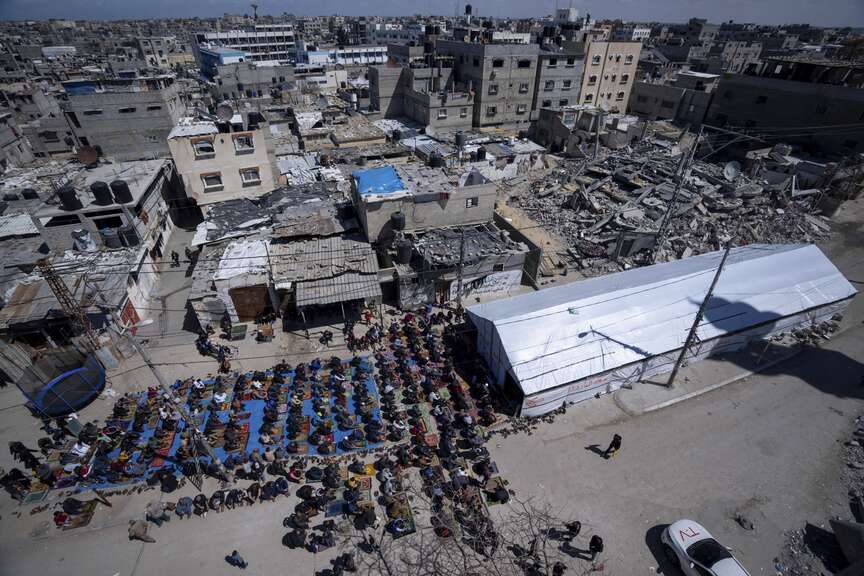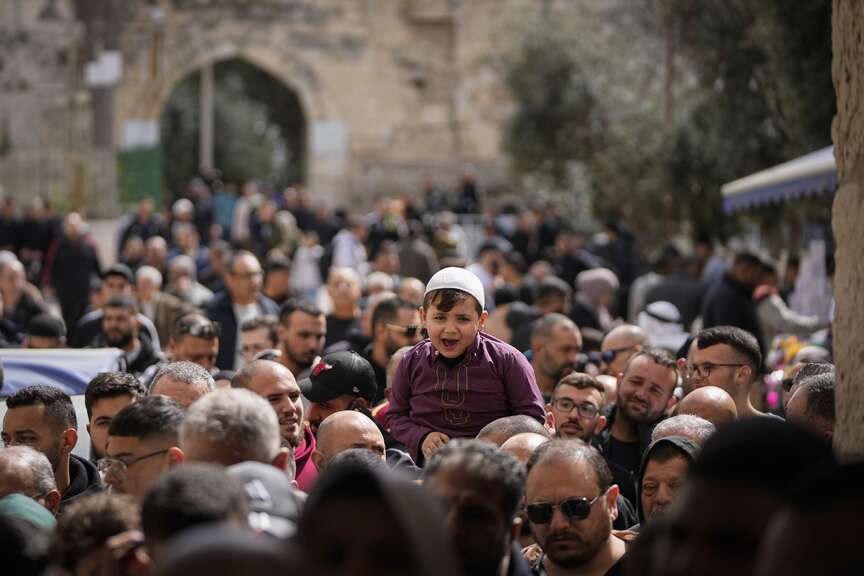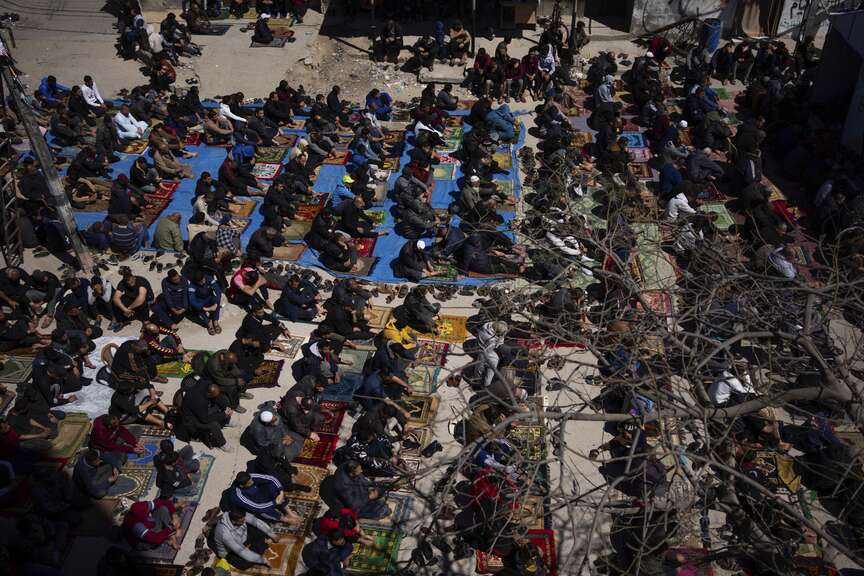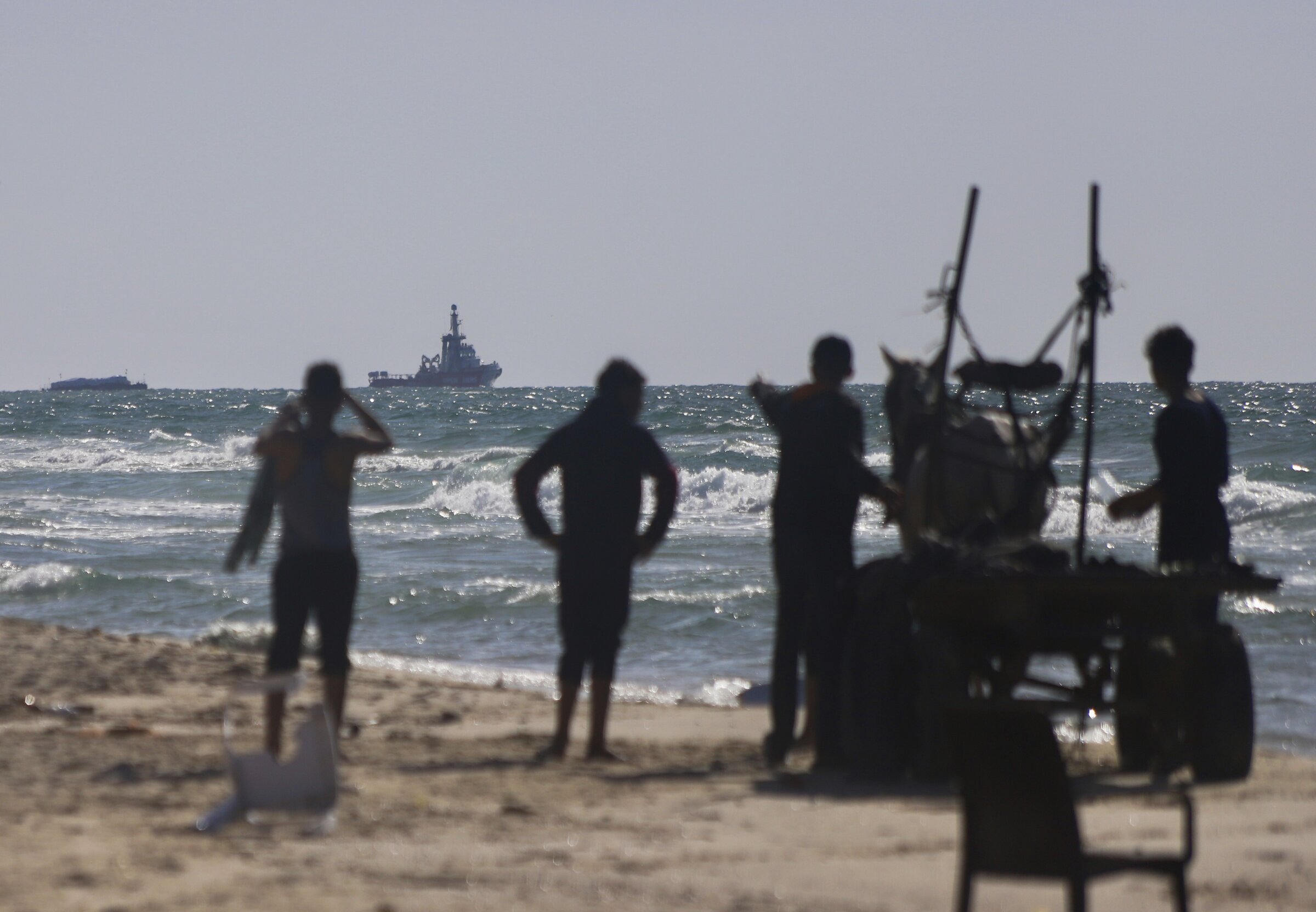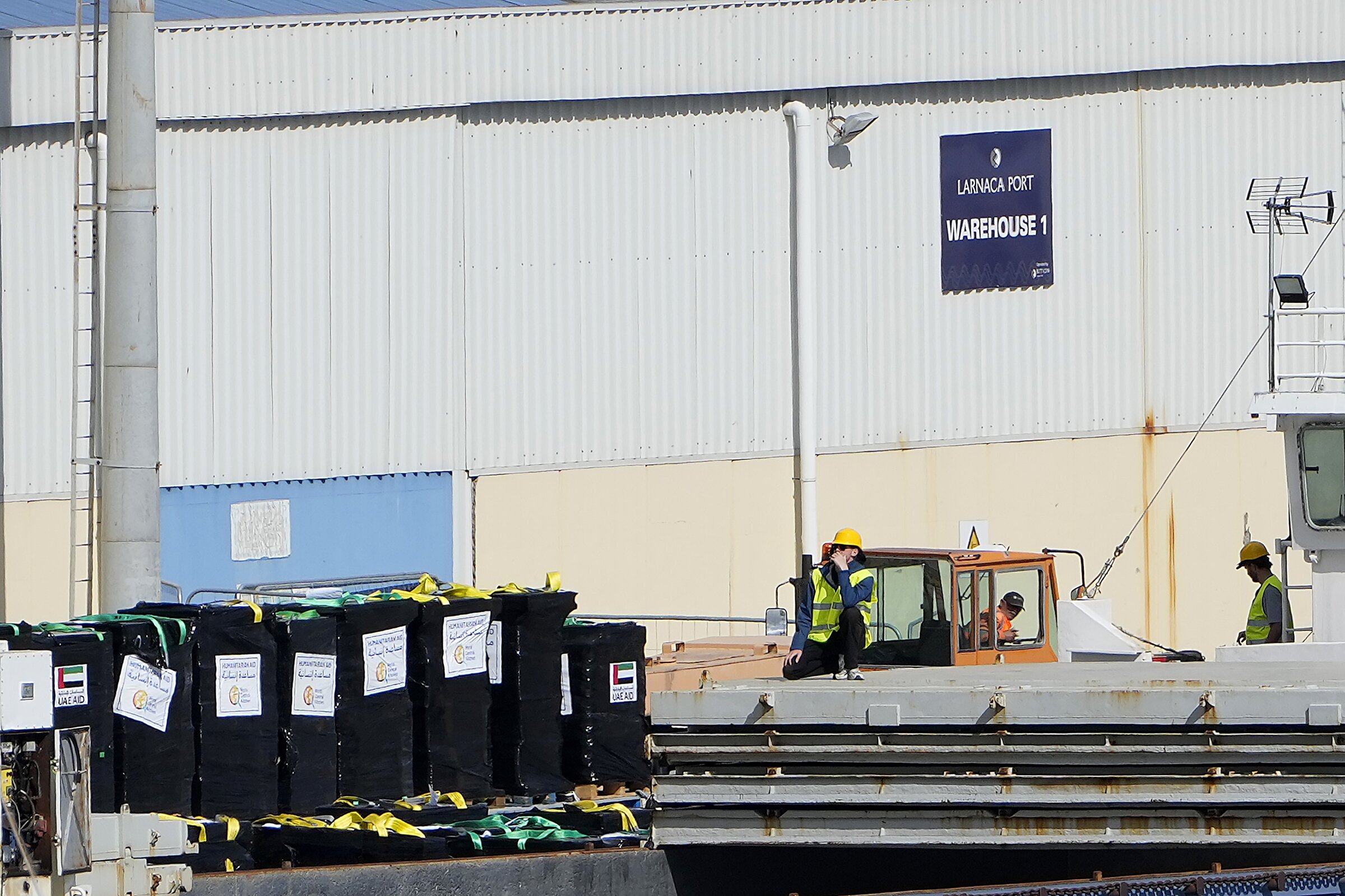WADI GAZA, Gaza Strip -- A ship delivered 200 tons of humanitarian supplies, food and water to Gaza on Friday, the Israeli military said, inaugurating a sea route from Cyprus for aid to help ease the humanitarian crisis brought on by Israel's 5-month-old offensive in the enclave.
Israel has been under increasing pressure to allow more aid into Gaza, especially in the Palestinian territory's isolated north where hunger is at its worst, with many people reduced to eating animal feed and weeds. The United States has joined other countries in airdropping supplies into northern Gaza and has announced separate plans to construct a pier to get aid in.
Aid groups said the airdrops and sea shipments are far less efficient than trucks in delivering the huge amounts of aid needed. Instead, the groups have called on Israel to guarantee safe corridors for truck convoys after land deliveries became nearly impossible because of military restrictions, ongoing hostilities and the breakdown of order after the Hamas-run police force largely vanished from the streets.
The ship, operated by the Spanish aid group Open Arms, left Cyprus on Tuesday towing a barge laden with food, including rice, flour, lentils, beans, tuna and canned meat. The food was sent by World Central Kitchen, the charity founded by celebrity chef José Andrés, which operates kitchens providing free meals in Gaza.
Throughout the day Friday, the ship could be seen off Gaza's coast. In the evening, the military said its cargo had been unloaded onto 12 trucks. Grainy footage released by the military showed a truck on a pier approaching the barge.
The food is to be distributed in the north, the largely devastated target of Israel's initial offensive in Gaza, where up to 300,000 Palestinians are believed to remain, mostly cut off by Israeli forces since October.
The delivery is intended to pave the way for larger shipments. A second vessel will head to Gaza once the supplies on the first ship are distributed, Cyprus' Foreign Minister Constantinos Kombos said. Its timing depends in part on whether the Open Arms delivery goes smoothly, he said.
The Israel-Hamas war was triggered by Hamas' Oct. 7 attack on Israel that killed 1,200 people and resulted in another 250 being taken into Gaza as hostages. Israel's offensive in Gaza has killed more than 31,000 Palestinians and driven most of Gaza's 2.3 million people from their homes. A quarter of Gaza's population is starving, according to the United Nations.
ATTACK ACCUSATIONS
The Palestinian Health Ministry in Gaza accused Israeli forces late Thursday of attacking Palestinians waiting for an aid convoy at a distribution point in northern Gaza, the Kuwaiti Roundabout, killing at least 20 people and wounding 155. At Shifa Hospital, doctors said the victims were mostly hit by live fire, with some showing signs of being crushed.
The Israeli military denied that its forces fired at civilians or the convoy. In a statement, it said Palestinian gunmen opened fire among the crowd and that some were run over by the trucks. Aerial footage released by the military appeared to show only one man pushing and shoving people.
Three people interviewed by The Washington Post who said they went to meet the trucks Thursday night said they saw an Israeli helicopter and drones randomly firing on Palestinians who had gathered to receive the aid. Two of the witnesses said they saw armed Palestinian police officers as well, but they were some distance from the convoy, and one said the officers fired their weapons in the air to control the crowds.
Mahmoud Basal, a spokesperson for the Civil Defense in Gaza, said in an interview late Thursday that thousands of people who had gathered near the roundabout were forced to "take cover" after what he said was shooting by Israeli helicopters and drones, followed by tank and artillery fire. An artillery shell landed on a destroyed house where people were sheltering, he said.
In a statement, the Israeli Defense Forces said it had "facilitated the passage" of 31 trucks carrying humanitarian aid intended for residents in northern Gaza. About an hour before they arrived at the "humanitarian corridor, armed Palestinians opened fire while Gazan civilians were waiting," the statement said.
"The Palestinian gunmen continued to shoot as the crowd of Gazans began looting the trucks," the statement said. No Israeli "tank fire, airstrike or gunfire was carried out toward the Gazan civilians at the aid convoy," it added, calling reports that Israel was responsible for the deaths part of a "smear campaign" by Hamas.
Abdul Hakim Jawwad, one of the witnesses, said he left his home in the town of Beit Lahiya around 7 p.m. after the evening prayer. About an hour later, when he was about 350 feet north of the Kuwaiti Roundabout, he first heard what he described as artillery and gunfire. Then, he said, he saw a helicopter and a quadcopter that fired "shells and bullets."
Jawwad said the firing began before the trucks arrived. It stopped at times, he said, when a truck sped through the crowd and people clamored to jump in and grab flour or other supplies.
"The trucks ran over people, too," he said. "I am one of those people. A truck ran over my foot."
Jawwad also said he saw groups of men, some armed with automatic weapons, whom he identified as police. Several times they "fired into the air" to quiet the crowds, he said, adding that he did not see Palestinians firing on other Palestinians.
The accounts could not be independently corroborated. Late Friday, the IDF released grainy, edited footage of what it said showed "Palestinian gunmen opening fire in the midst of Gazan civilians."
The Post could not immediately verify the location in the footage or the events the IDF said it depicted.
Bloodshed surrounding an aid convoy on Feb. 29 killed 118 Palestinians in northern Gaza, when the Israeli military said its forces fired at people in the crowd who were advancing toward them and that tanks fired warning shots to disperse them. Witnesses and hospital officials said many of the casualties were from bullet wounds.
Military officials initially blamed many of the deaths on a stampede. A later military command review said only that the stampede caused "significant harm" without addressing the cause of the deaths.
AIRDROPS CRITICIZED
After that, plans for the sea route took shape, and the United States and other countries joined Jordan in dropping aid into the north by plane.
But people in northern Gaza say the airdrops cannot meet the vast need. Many can't access the aid because people are fighting over it, said Suwar Baroud, 24, who was displaced by the fighting and is now in Gaza City. Some people hoard it and sell it in the market, she said.
A recent airdrop that malfunctioned plummeted from the sky and killed five people.
Another landed in a sewage and garbage dump, Riham Abu al-Bid said. Men ran in but were unable to retrieve anything, she said.
"I wish these airdrops never happened and that our dignity and freedom would be taken into consideration so we can get our sustenance in a dignified way and not in a manner that is so humiliating," she said.
On average, around 115 supply trucks a day have entered Gaza over the entire course of the war, according to figures released by the Israeli prime minister's office -- far below the average of 500 a day before Oct. 7 -- though on some days the number spikes to above 200.
This week, Israel began allowing trucks to enter directly into the north, a step aid groups have long called for. The military has also been arranging private commercial convoys and says more than 300 trucks -- mainly private -- have entered the north since the beginning of February.
The Gaza Health Ministry said Friday that at least 31,490 Palestinians have been killed in the war. The ministry does not differentiate between civilians and combatants in its count but says women and children make up two-thirds of the dead.
International mediators have been working to broker a cease-fire, though hopes were thwarted for one before the Muslim holy month of Ramadan, which started this week.
Hamas put forward a new cease-fire proposal calling for a three-stage process, according to a report by Al Jazeera television that was confirmed to The Associated Press by a Palestinian official.
The first six-week stage would bring a partial Israeli pullback in Gaza and the release of all female hostages held by the militants in exchange for the release of dozens of Palestinian prisoners held by Israel. In the second stage, a permanent cease-fire would be declared and Hamas would release all Israeli soldiers being held. In the third stage, reconstruction of Gaza would begin and the Israeli blockade of Gaza would be lifted.
Israeli Prime Minister Benjamin Netanyahu called the proposal "unrealistic," but said Israel would send negotiators to Qatar for more talks.
Netanyahu's office also said Friday that Israel has approved military plans to attack Rafah, the southernmost town in Gaza where about 1.4 million displaced Palestinians are sheltering.
It said the operation will involve the evacuation of the civilian population but did not give details or a timetable. The military said Wednesday that it planned to direct civilians to "humanitarian islands" in central Gaza.
Information for this article was contributed by Wafaa Shurafa, Bassem Mroue and Jack Jeffery of The Associated Press and by Kareem Fahim, Miriam Berger, Hazem Balousha, Michael Birnbaum, Hajar Harb, Itay Stern and Adela Suliman of The Washington Post.
